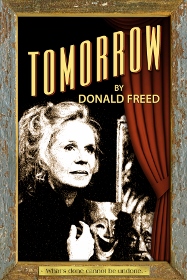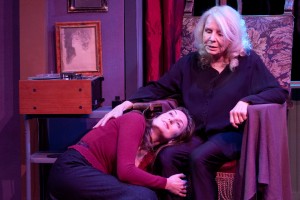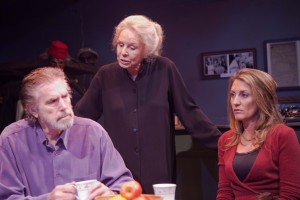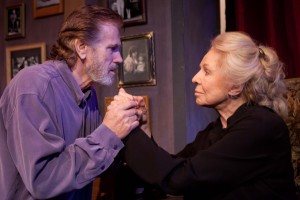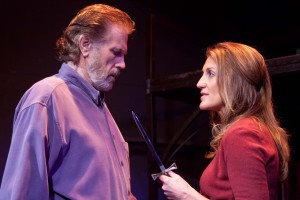WHEN ’˜TOMORROW’ ISN’T ANOTHER DAY
Anyone who cares about acting or classical theater or Shakespeare (particularly Macbeth) must see Donald Freed’s new play Tomorrow. It has moments of spot-on, sublime specificity that make you gasp out loud. Without fuss, without preening, it explores the art of acting as a means of exploring the art of living. It offers no easy answers’”or even easy questions.
Jenn Robbins plays Laura, a classically trained theater actress on the brink of film stardom. She visits a legendary and reclusive actress named Abigail Booth (Salome Jens)’”who may or may not be a descendent of those Booths’”to get advice and approval for assaying Lady Macbeth in a hush-hush new stage-to-screen double production. The third character is Booth’s nephew Jamie (Geoffrey Forward), a former actor and teacher once famous for playing Macbeth who is now as reclusive as his aunt.
Laura comes for help and she gets it. That’s pretty much the plot, in literal terms, but this play is not at all literal. It takes place the day after the United States Supreme Court makes its Bush v. Gore ruling, and the idea of a populace under siege’”and more to the point, of creative artists and art itself under siege’”is woven throughout.
Is there a place for art in what Gore Vidal called The United States of Amnesia? It’s something that I wonder about all the time personally, not in the abstract. And in the character of Laura, Freed has created a vibrant artist at the very center of that dilemma. She is a real actress’”not a caricature, and most agreeably, not a throwback to some idea of what it might have been like to be a classical actress in another time; there’s no trace of the Midatlantic bathos that is often held up as what “theater folk” are like’”an idea that owes more to MGM than to anything that ever happened on an actual stage.
Robbins wonderfully strikes a perfect balance between being a girl who hangs out at Urth Café and a woman who in another time might have grown into the kind of legitimate theater stardom that doesn’t exist anymore: Cornell, Bankhead, Fontanne, Hayes. That kind of stardom.
Robbins is funny, surprising, contradictory, and appropriately maddening. There’s a great bit near the end, when Jamie, in an emotionally turbulent state, recalls having an unsettling dream the night before. “What was it? Was I in it?” Laura asks with breathless desperation. It’s the sort of moment that can be written and played to conform to an easy, cheap stereotype; but here it feels entirely fresh.
The most amazing thing that Robbins does, though, is make speech and acting exercises into vibrant mini-dramas, with real suspense. Can she sound like Judith Anderson? Will she capture the true depth of the love that the doomed Lady Macbeth feels for her doomed husband? If these sound like pedantic questions in the asking, they get riveting answers in the telling, and in the dramatizing.
The role of Abigail Booth is written with understanding, humor, great affection, and what feels like a deep appreciation of what it means to sacrifice something for real’”your soul, your life’”in order to stay true to your own experience of the world and of your art. Salome Jens is a force beyond nature. Yes, she has the passion, the voice, the majesty’”but oh, how she shines in stillness, in softness, and in the hesitations that can sometimes define what it is to be human.
One whole sequence is given over to Jens and Robbins working through Lady Macbeth’s reading of a long-anticipated letter from her husband. Their exploration into the character, and into the play itself, is a revelation’”not the least because it deepens and broadens your own understanding of Macbeth’”but also because of how believable the actresses make it. It’s almost shocking how real their characters’ discoveries feel. It’s two actresses playing two actresses, and all four of them surprising themselves and us. Brilliant.
Geoffrey Forward’s character Jamie is a little less fully realized in the writing. That his intentions and motivations are not transparent is laudable and agreeable. That they are sometimes opaque is occasionally unsatisfying. It’s a very tough role. Jamie was famous and successful, until one day in the middle of playing Macbeth, he froze, then left the stage, never to return. Now he and his aunt seem tied eternally together, at once in the shadows and not.
There is the rather soapy suggestion that she might actually be his mother, but I am less interested in the biology of it, since she is so clearly his mother (and his father for that matter) in every way that counts. Her art gave birth to his. For them, that’s all that matters. He gets involved with Laura without thinking it through, without understanding that he might have to revisit his own fears and inadequacies in order to give her what she needs.
One thing is for certain: Forward and Robbins should absolutely do Macbeth somewhere, anywhere. As soon as possible.
At first glance, it seems like one of the best things to say about director Damien Cruden is that he stays out of his actors’ way, yet that doesn’t begin to describe the delicacy and natural eye he brings to the show. With just three characters and one set, it’s quite easy for things to feel static and uninteresting, with the actors forming the kinds of triangles that soap operas use so endlessly, with everyone looking out the same way and talking at one another. None of that here. And the pacing is marvelous. Never a dull moment, but never a rushed one either.
I love Stephanie Kerley Schwartz’s costumes. Particularly with Laura, she finds the same quirky balance in the clothes that Robbins finds in the character. But Schwartz’s set design hovers uneasily between naturalism and something grander. When Jamie starts taking it apart at the end, it’s an idea that I wish had been explored more fully, and sooner. Music cues were a bit intrusive, both in terms of volume and length; overall, Christopher Moscatiello’s sound design feels like it’s trying a little too hard.
Tomorrow is an international premiere, and a coproduction of the Skylight Theatre Company, Rogue machine, and the UK’s York Theatre Royal. They have much to be proud of. Yet I do have to admit that’”notwithstanding my genuine and enthusiastic belief that this is a play and a production that must not be missed’”I’m not sure I understand it fully. Is it all about endings, even though it feels like it means to be about both endings and beginnings? Something smart and knowing is creeping around the edges, just out of reach.
photos by John Flynn
Tomorrow
presented by Skylight Theatre Company, Rogue Machine and York Theatre Royal
Skylight Theatre Complex – 1816 ½ N. Vermont
scheduled to end on April 21, 2013
for tickets, call 702-582-8587 or visit http://www.ktcla.com
